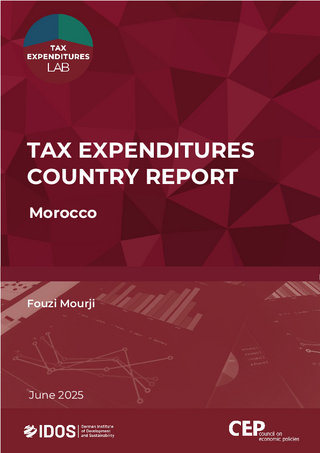Tax expenditures country report: Morocco
Mourji, FouziBuchveröffentlichungen (2025)
German Institute of Development and Sustainability (IDOS)/Council on Economic Policies (CEP)
DOI: https://doi.org/10.23661/cr4.2025
frz. Ausg. u.d.T.:
Rapport sur les dépenses fiscales: Maroc
Morocco’s reports on tax expenditures (TEs) analyse the derogatory measures adopted as part of the Finance Act. The reports highlight the impact of these measures on public revenue and their socio-economic usefulness. This country report identifies the main limitations and makes recommendations for improving the transparency and effectiveness of tax expenditure policies. It is based on government reports published until December 2023.
Transparency: Morocco scores 55.7 out of 100 in the Global Tax Expenditures Transparency Index (GTETI), ranking 28th out of 105 countries. Despite improvements in the publication of data, the index reveals a number of shortcomings in terms of the clarity of information and the assessment methodology. The government’s TE reports are available to the general public, but they are not always easy to understand, which means that the presentations need to be simplified, and the data made more accessible.
Complexity: The complexity of the Moroccan tax system is based on a multitude of derogatory measures spread across different tax types (value-added tax, corporate tax, income tax). In 2023, 251 derogatory measures were identified, representing a budgetary cost of MAD 35.4 billion (2.4% of GDP). This structure complicates the management and monitoring of tax expenditures. Criticism is levelled at the lack of exhaustive impact studies of these derogatory measures and the absence of clear criteria for creating or removing incentives, which are sometimes influenced by political and economic lobbies.
Fiscal sustainability: This report highlights the continuing decline in tax expenditures as a percentage of GDP, from 2.9% in 2022 to 2.4% in 2023, reflecting a desire to rationalise and reduce tax expenditures. Concerns remain about the system's ability to mobilise sufficient resources to support economic development while maintaining balanced budgets. It should be noted that the latest report on tax expenditures accompanying the Finance Bill (PLF) for 2025 shows that this trend is continuing: as a percentage of GDP, tax expenditures fell to 2.1% in 2024 mainly due to the abolition of 24 measures as part of the VAT reform implemented during the year, resulting in a 28.3% reduction in VAT related tax expenditures. Tax expenditure as a whole has been reduced by 13%, from MAD 37 billion in 2023 to MAD 32.1 billion in 2024.
Evaluation challenges: There is still room for improvement regarding the evaluation of tax expenditures. The report of the Cour des comptes (Court of Accounts) highlights “the absence of in-depth socio-economic impact studies and a structured evaluation framework. Decisions on tax expenditures are often taken without in-depth studies of their effectiveness, which limits the justification for their contribution to national development”.
This report highlights the challenges and opportunities associated with tax expenditures in Morocco. Although progress has been made, further reforms are desirable to improve the management and effectiveness of tax expenditures.

